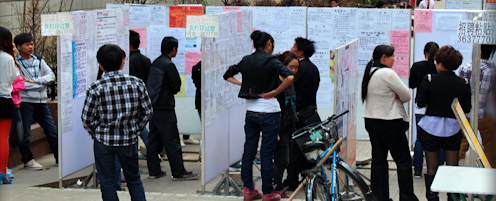China's youth unemployment problem has become a crisis we can no longer ignore
- Written by Christian Yao, Senior Lecturer, Te Herenga Waka — Victoria University of Wellington

Youth unemployment is a global problem, but in China the rate - 21.3%[1] - is particularly alarming, not just because it’s high, but because it could affect other economies and geopolitical relations.
The release of the rate, which more than doubled the pre-COVID rate of May 2018, coincided with China’s National Bureau of Statistics announcing it would no longer report age specific data because it needed to “improve and optimise labour force survey statistics[2]”.
Youth unemployment is a complex issue, but even more so in China as a result of government policy and society’s expectations.
Under the Hukou system, households in China are required to register, and authorities then determine where they live and work and which public services they can access.
The system often stops rural residents taking advantage of urban opportunities, which can limit their work prospects.
The stress and uncertainty experienced by this demographic is only worsened by the expectations that come with being the only child in the family as a result of China’s one child policy, which was abandoned only seven years ago.

















